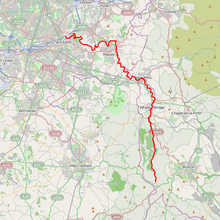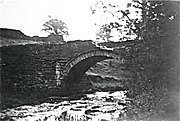|
River Goyt
The River Goyt is a tributary of the River Mersey in North West England. EtymologyThe name Goyt may be derived from the Middle English gote, meaning "a watercourse, a stream".[3] Derivation from the Welsh gwyth meaning "vein" has been suggested, but described as "doubtful".[4] CourseThe Goyt rises on the moors of Axe Edge, near the River Dane and the Cat and Fiddle Inn. The area is known as the Upper Goyt Valley. The old Cat and Fiddle Road from Buxton to Macclesfield crosses the river just as it turns northwards to flow down its well-known valley. The river then flows under Derbyshire Bridge, which was the old boundary between Derbyshire and Cheshire. Later it reaches an old packhorse bridge that was moved when Errwood reservoir was built in the 1960s (see photo below). Further downstream there is another reservoir, the Fernilee Reservoir, built in 1938.[5] The original line of the Cromford and High Peak Railway can be seen near this point. The Goyt then passes through Taxal and Horwich End where it is joined by the Todd Brook. Thereafter it passes through Whaley Bridge, New Mills (where it is joined by the River Sett) and Marple Bridge. Having been joined by the River Etherow, the Goyt joins the River Tame at Stockport, forming the River Mersey. The section of the Goyt valley between Etherow Country Park and Whaley Bridge is followed by the Goyt Way, a 10-mile (16 km) walking route and part of the longer Midshires Way.[6] The River Goyt is reputedly haunted by the ghost of a girl whose Royalist lover drowned in the river.[7] PollutionThe river's Environment Agency pollution classification changed from moderate to poor in its lower section from the Etherow to the Mersey in 2016,[8] and in 2015 for the New Mills to Whaley Bridge length.[9] Otherwise the quality is moderate.[10][11] Tributaries
Gallery
See alsoList of mills in New Mills area ReferencesKML is from Wikidata
Further reading"The Goyt Valley (Fact Sheet: 16)" (PDF). Peak District National Park Authority. Archived from the original (PDF) on 12 May 2013. Retrieved 28 April 2014. |
||||||||||||||||||||||||||||||||||||||||||||||||||||||||||||||||||||||||||||||||||||||||||||||||||||||||||||||||||||||||||||||||||||||||||||||||||||||||||||||||||||||||||||||||||||||||||||||||||||||||||||||||||||||||||||||||||||||||||||||||||||||||||||||||





